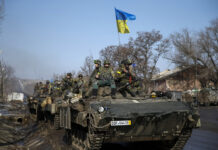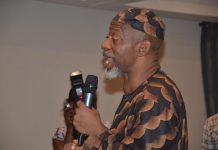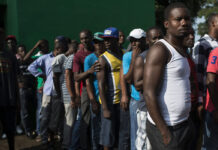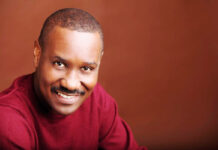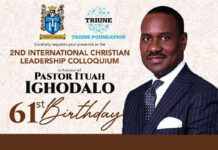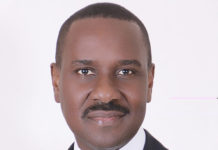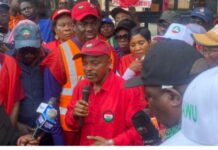Barring last minute mergers and withdrawals, the 2023 presidential poll will have an unwieldy total of 18 presidential hopefuls across 18 political parties. Among them are three front-runners. They are: Atiku Abubakar of the Peoples’ Democratic Party (PDP); Bola Tinubu of the All Progressives Congress (APC) and Peter Obi of the Labour Party (LP). To this trio belongs very interesting stats.
Atiku Abubakar
Abubakar, 76-year-old, belongs to the old establishment of the PDP – the erstwhile ‘biggest political party in Africa’ that was touted to be in power for 100 years until it was ousted. The retired Customs officer turned tycoon was the Vice President at the beginning of the Fourth Republic. Atiku has since been angling to be president. He is a serial contestant that featured in 1993, 2007, 2011, 2015 and 2019 presidential elections. He therefore has experience on his side. Besides being a moneybag, Atiku is a Fulani like the sitting president. He has very strong followers in the North that has the bloc votes that are critical in winning the presidential contest. And if the narrative of the North not willing to relinquish power to the South is true, then an Atiku presidency is not out of place.
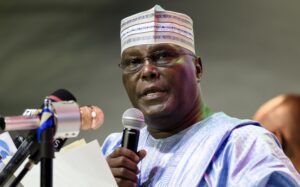
But Abubakar’s weaknesses are as legion as his strength. Landmark is his fallout with his erstwhile principal, President Olusegun Obasanjo, at the twilight of their eight-year administration. Obasanjo wrote a damning verdict on Atiku’s persona in his memoir – My Watch. Really, there is no love lost between the two and it is not a plus to Atiku’s credibility rating. More significant to his fate in the race is Atiku’s faceoff with the G5 PDP governors, led by Governor Nyesom Wike of Rivers State. Since the party primaries were concluded and Atiku toppled Wike to emerge the standard bearer, the Wike-led G5 has been an albatross to Atiku’s ambition.
The aggrieved governors are the main rallying point of the former ruling party. This seemingly intractable conflict of interest will rob Atiku of votes in the PDP strongholds in the South – Rivers, Benue, Enugu, Oyo and Abia States. Curiously, the breakaway camp has vouched to support a Southern presidency in 2023! Atiku’s chances are also not helped by the candidature of another Northern bigwig, Rabiu Kwankwaso, of the New Nigerian Peoples Party (NNPP). Kwankwaso and his large followers in Kwankwasiyya movement are touted to split Atiku’s potential votes in the North, which will further brighten chances of his opponents. Beyond the North, Atiku has not really been popular country-wide. He practically lives in Dubai. He also carries the baggage of being a part of the wobbly old establishment that has lured the country to this crossroad and may have little or nothing to offer its renaissance.
Bola Tinubu
Like Atiku, Tinubu bears equal weight of membership of the old establishment, and experience in the political game too. Tinubu, 70-year-old, is a former governor of Lagos State at the time Atiku was Vice President. He is often regarded as the father of modern Lagos and the main kingmaker of the Lagos political empire. The astute politician is remarkable for attracting credible allies to his administration and party, irrespective of ethnic and religious linings. It is believed that he would bring the same deftness and nationalism to Aso Rock, if elected as the next president. After all, he has been instrumental in the formation of the ruling APC, emergence of President Buhari as its flag-bearer in 2015 and his victory against the incumbent, after three failed attempts.
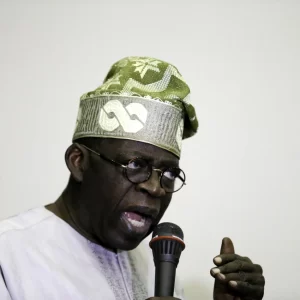
Tinubu, the National Leader of the APC, felt it is his turn (codenamed: emi l’o kan) to be the president. Indeed, he has the ruling APC and its 21 governors behind him. He is also favoured by the intra-party’s agreement that it is the turn of the South to produce the president – in a revolving rotational policy of the party. But Tinubu also carries weighty flaws too. First is his rather frail posture that is adjudged inconsistent with the demanding routine of the Office of Mr. President. Nigerians are asking: If Mr. Buhari has spent 237 days religiously taking care of himself at London hospital in seven years, can a disheveled Nigeria afford another leader that is lacking in vitality?
Since the campaign started in September, a heavily-packaged Tinubu has steadily shown signs of fatigue and incoherence, even at well-censored town hall meetings he has preferred over political debates. He surely needs more rest than a president should have or one a drifting nation can afford! Mr. Buhari’s poor legacy is also a dent on Tinubu’s chances. Tinubu was his kingmaker going into the 2015 elections, and both represent the same party. Tinubu can rarely recuse himself from Buhari’s horrendous outing of the last eight years. If Buhari’s administration is a measuring rod for Tinubu’s presidency, then not many Nigerians would concede to the continuation of Buhari’s awful legacy.
Unfortunately, Tinubu is also a credibility doubt. Almost everything about him is in contention: his real name, age, childhood, academic qualification, work experience, crime records, source of wealth, health status, and stake in the Lagos political and economic terrain. He is yet to gain far-reaching acceptance in the South, and that has been made worse by the controversial Muslim-Muslim ticket in a country clouded by mutual suspicion between the two dominant religions. Clearly, Tinubu has his hurdles cut out in the race to become Buhari’s successor.
Peter Obi
Compared with the two heavyweights above, Peter Obi is an outsider in the game – a David before Goliaths! Obi, 61-year-old, surpasses others in the smell test rating, and is a candidate to watch closely. A successful businessman and former governor of Anambra State, Obi is a candidate of the Labour Party and a breath of fresh air to cause a rare upset in the old political calculus. He has an intimidating fan base of youths and passionate followers (nicknamed: Obi-dients) on the social media space. Obi is loved for non-flamboyance posture. Memories of how he was persecuted for his uncompromising shrewd management of state resources in Anambra has further endeared Obi to a growing mammoth of Nigerians that desire a real change in 2023.
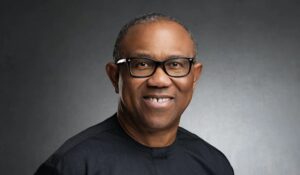
For his character, competence and, perhaps ideas, many rightly believed he is a leadership-material to salvage the country from the jaws of its backward ruling elites – who are already irritated by Obi’s emergence. But aside credible credentials, is an Obi presidency primed for the rotten political space? Can he pull it off? Evidence is on the contrary. First, Mr. Obi was not much of a political success in Anambra to wet a good presidential appetite. He was seemingly too rigid to bend or manage local politics to his advantage or for political stability. Can such a candidate be trusted with a fragile, vastly polarised country like Nigeria and a National Assembly literally in the pocket of the opposition parties – the so-called old establishments and profiteers of the current dysfunctional system?
Obi has to win first. It is expected that the preponderance of Obi’s social media loyalists will come out on Election Day to vote and not rely on feel-good high ratings of opinion polls. The Labour Party has rarely pulled any weight in elections. Its last presidential candidate in 2019 pooled an abysmal 5,074 votes out of 28 million cast! Now, and beyond the odd narrative of an “Ibo presidency”, will Obi’s votes be enough to net the highest, coupled with the constitutional spread of 25 per cent of the cast in at least 24 of the 36 states? Even Obi’s running mate, Datti Baba-Ahmed, reckons that it may be challenging, especially in 10 Northern states that are programmed to vote along ethnic and religious lines. Mr. Obi has the positive ambition to immediately upturn the fortunes of the country for good. But will the Obi-dients still be patient enough to weather pains of President Obi’s sweeping reforms like fuel subsidy removal, and other hard choices that await all in the post-Buhari years?
All choices have consequences. Good luck, Nigerians!
The astute politician is remarkable for attracting credible allies to his administration and party, irrespective of ethnic and religious linings. It is believed that he would bring the same deftness and nationalism to Aso Rock, if elected as the next president. After all, he has been instrumental in the formation of the ruling APC, emergence of President Buhari as its flag-bearer in 2015 and his victory against the incumbent, after three failed attempts. Tinubu, the National Leader of the APC, felt it is his turn (codenamed: emi l’o kan) to be the president. Indeed, he has the ruling APC and its 21 governors behind him. He is also favoured by the intra-party’s agreement that it is the turn of the South to produce the president – in a revolving rotational policy of the party.
But Tinubu also carries weighty flaws too. First is his rather frail posture that is adjudged inconsistent with the demanding routine of the Office of Mr. President. Nigerians are asking: If Mr. Buhari has spent 237 days religiously taking care of himself at London hospital in seven years, can a disheveled Nigeria afford another leader that is lacking in vitality? Since the campaign started in September, a heavily-packaged Tinubu has steadily shown signs of fatigue and incoherence, even at well-censored town hall meetings he has preferred over political debates. He surely needs more rest than a president should have or one a drifting nation can afford!
Mr. Buhari’s poor legacy is also a dent on Tinubu’s chances. Tinubu was his kingmaker going into the 2015 elections, and both represent the same party. Tinubu can rarely recuse himself from Buhari’s horrendous outing of the last eight years. If Buhari’s administration is a measuring rod for Tinubu’s presidency, then not many Nigerians would concede to the continuation of Buhari’s awful legacy. Unfortunately, Tinubu is also a credibility doubt. Almost everything about him is in contention: his real name, age, childhood, academic qualification, work experience, crime records, source of wealth, health status, and stake in the Lagos political and economic terrain. He is yet to gain far-reaching acceptance in the South, and that has been made worse by the controversial Muslim-Muslim ticket in a country clouded by mutual suspicion between the two dominant religions. Clearly, Tinubu has his hurdles cut out in the race to become Buhari’s successor.
Peter Obi
Compared with the two heavyweights above, Peter Obi is an outsider in the game – a David before Goliaths! Obi, 61-year-old, surpasses others in the smell test rating, and is a candidate to watch closely. A successful businessman and former governor of Anambra State, Obi is a candidate of the Labour Party and a breath of fresh air to cause a rare upset in the old political calculus. He has an intimidating fan base of youths and passionate followers (nicknamed: Obi-dients) on the social media space. Obi is loved for non-flamboyance posture. Memories of how he was persecuted for his uncompromising shrewd management of state resources in Anambra has further endeared Obi to a growing mammoth of Nigerians that desire a real change in 2023.
For his character, competence and, perhaps ideas, many rightly believed he is a leadership-material to salvage the country from the jaws of its backward ruling elites – who are already irritated by Obi’s emergence. But aside credible credentials, is an Obi presidency primed for the rotten political space? Can he pull it off? Evidence is on the contrary. First, Mr. Obi was not much of a political success in Anambra to wet a good presidential appetite. He was seemingly too rigid to bend or manage local politics to his advantage or for political stability. Can such a candidate be trusted with a fragile, vastly polarised country like Nigeria and a National Assembly literally in the pocket of the opposition parties – the so-called old establishments and profiteers of the current dysfunctional system?
Obi has to win first. It is expected that the preponderance of Obi’s social media loyalists will come out on Election Day to vote and not rely on feel-good high ratings of opinion polls. The Labour Party has rarely pulled any weight in elections. Its last presidential candidate in 2019 pooled an abysmal 5,074 votes out of 28 million cast! Now, and beyond the odd narrative of an “Ibo presidency”, will Obi’s votes be enough to net the highest, coupled with the constitutional spread of 25 per cent of the cast in at least 24 of the 36 states? Even Obi’s running mate, Datti Baba-Ahmed, reckons that it may be challenging, especially in 10 Northern states that are programmed to vote along ethnic and religious lines.
Mr. Obi has the positive ambition to immediately upturn the fortunes of the country for good. But will the Obi-dients still be patient enough to weather pains of President Obi’s sweeping reforms like fuel subsidy removal, and other hard choices that await all in the post-Buhari years? All choices have consequences. Good luck, Nigerians!
